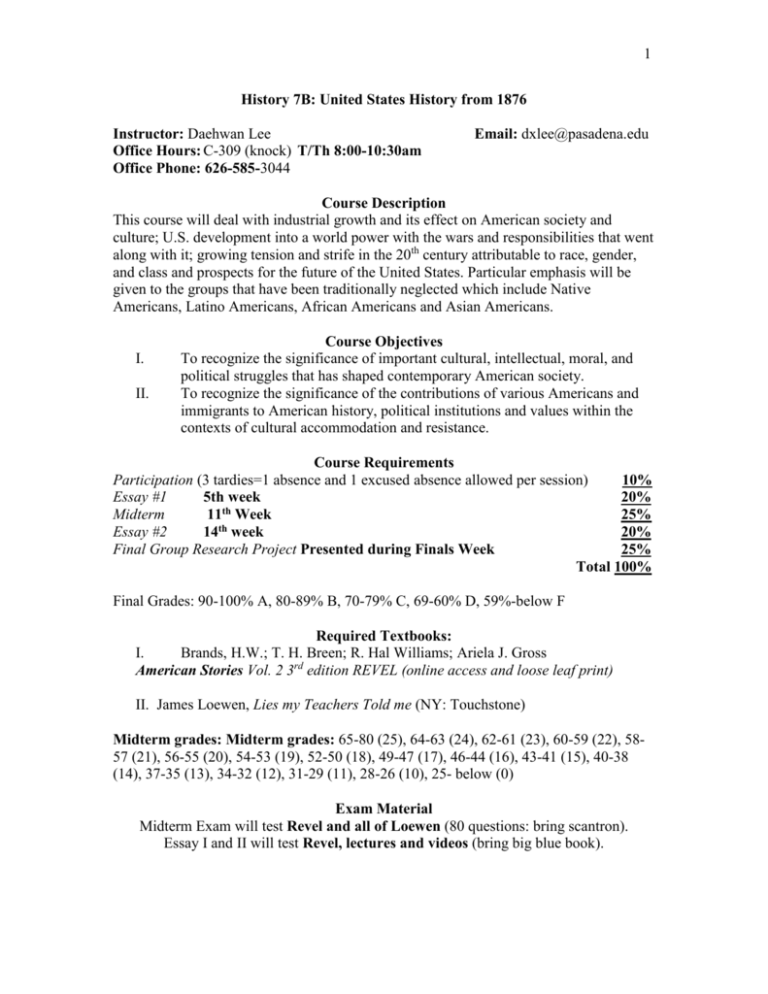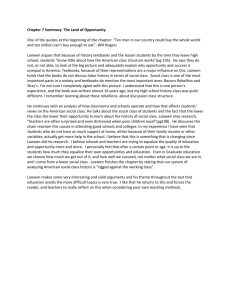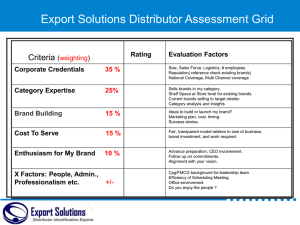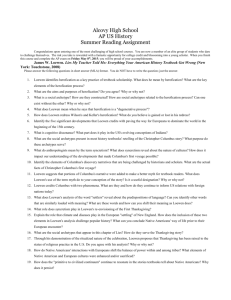Syllabus - Pasadena City College
advertisement

1 History 7B: United States History from 1876 Instructor: Daehwan Lee Office Hours: C-309 (knock) T/Th 8:00-10:30am Office Phone: 626-585-3044 Email: dxlee@pasadena.edu Course Description This course will deal with industrial growth and its effect on American society and culture; U.S. development into a world power with the wars and responsibilities that went along with it; growing tension and strife in the 20th century attributable to race, gender, and class and prospects for the future of the United States. Particular emphasis will be given to the groups that have been traditionally neglected which include Native Americans, Latino Americans, African Americans and Asian Americans. I. II. Course Objectives To recognize the significance of important cultural, intellectual, moral, and political struggles that has shaped contemporary American society. To recognize the significance of the contributions of various Americans and immigrants to American history, political institutions and values within the contexts of cultural accommodation and resistance. Course Requirements Participation (3 tardies=1 absence and 1 excused absence allowed per session) 10% Essay #1 5th week 20% Midterm 11th Week 25% Essay #2 14th week 20% Final Group Research Project Presented during Finals Week 25% Total 100% Final Grades: 90-100% A, 80-89% B, 70-79% C, 69-60% D, 59%-below F Required Textbooks: I. Brands, H.W.; T. H. Breen; R. Hal Williams; Ariela J. Gross American Stories Vol. 2 3rd edition REVEL (online access and loose leaf print) II. James Loewen, Lies my Teachers Told me (NY: Touchstone) Midterm grades: Midterm grades: 65-80 (25), 64-63 (24), 62-61 (23), 60-59 (22), 5857 (21), 56-55 (20), 54-53 (19), 52-50 (18), 49-47 (17), 46-44 (16), 43-41 (15), 40-38 (14), 37-35 (13), 34-32 (12), 31-29 (11), 28-26 (10), 25- below (0) Exam Material Midterm Exam will test Revel and all of Loewen (80 questions: bring scantron). Essay I and II will test Revel, lectures and videos (bring big blue book). 2 Attendance, Enrollment and Participation If you are absent from class, you are still responsible for all information relayed in class and for completing all missed work/readings before the next class. There will be no makeup exams. If you will be absent for an exam, you must let me know in advance so that you can take the exam prior to your absence. Tardiness is disruptive to the class, so please arrive on time. You will not pass the class just by attending. I expect you and you should expect to do college level work. Please come to class prepared having done the required readings, if not it will be reflected on your final grade. Students are responsible to drop course and if you are absent for more than 2 week’s worth of classes (6+ hours) you can be dropped or receive a Fail. Group Research Project Presentation Instructions Your final exam will be in the form of a group presentation during Finals. You will be required to form groups of 4 or 5 to present a controversial topic or a general topic in a new perspective that is relevant to this class. Topics may include but are not limited to Reconstruction, Spanish American War, Philippine American War, WWI, WII, the Cold War, Vietnam War, Korean War, Japanese Internment, 442nd Battalion, Civil Rights Movement, the Beat Movement, the Cuban Missile Crisis, the Persian Gulf Wars, Iraq War, War on Terror, North Korea issue, Technology, Internet, Media, Popular Culture, Racism etc. It will be graded on content (5%), presentation/creativity (5%), group participation (5%) and abstract, bibliography and research (5%) for a total of 20%. The project should be presented with PowerPoint or other means of visual communication. The more creative and multimedia the better! You will have 10 minutes total (includes set up time and any technological problems) for the presentation. Projects that mostly relied on non-scholarly work such as random internet sources will be deducted an entire grade, so make use of the library, personal networks and other sources. You must rely on as much primary sources as possible. Secondary sources will be accepted, however the use of primary sources almost guarantees a higher grade. Make sure you exchange all contact info with your group members. All group issues must be dealt with prior to week 2. Groups will be finalized by end of week 1. You can choose your own topics and no two groups will do the same topic. *A 2 page proposal will be due in week 3 that clearly details what your project will be, how it will be presented and what it entails including a preliminary bibliography or works cited page of scholarly and primary sources. One proposal per group. *The research project should be equivalent of a 15 page research paper. * You will turn in a finalized bibliography in MLA format before the presentation. *You will each turn in a grade sheet that grades each of your group member’s participation. If you give everyone 5/5 then just let me know and save paper. *Research can be qualitative or quantitative and must utilize a majority of the following sources: primary sources, experts, community organizations and scholarly books/journals. Check out www.besthistorysites.net for possible topics. 3 Extra Credit By doing extra credit, you can add up to 5% to your final grade. For example, if your final grade is 75% and if you did the extra credits you will be bumped up to 80% and get a B otherwise you would remain with a C for the class. This is ideal for students who may be border line at the end of the session. I will not bump your grade up, so it is up to you whether or not you think you will be border line at the end of the session. Due first class meeting of week 12. Plan A: Each extra credit activity is worth 1%. These activities or events include anything having to do with US History after 1876 and can be history conventions, seminars, guest lectures, films, community events, mock trials etc. Some will be announced in class, but it is the responsibility of the student to find the opportunities from at least 2 different categories. One rule is that you can only use one film/documentary. Each activity must be accompanied by proof of attendance i.e. Netflix receipt or screenshot, valid signature with contact info and a 2 page write up of the event and how it relates to our class and what you take away from the experience. Plan B: Get tutoring for this class from an assigned history/writing tutor for 8 hours and have the tutor sign off on your hours. Must get instructor approval first. This is worth 3%. You must do two more extra credit activities to get the full 5%. Additional Extra Credit 5%: Complete all Revel Chapter assignments for each week by Sunday with a score of 70% or better. This is all or nothing. If you miss a week or get a score below 70% you will not get any credit. Writing Instructions All work turned in must be typed, double-spaced and in essay format with introduction, body and conclusion. No late papers will be accepted and in the rare case that it is, it will be dropped an entire grade per day late. Email attachments will not be accepted. Computer problems or other technological problems may occur so save frequently, save in multiple places and plan ahead to print it out on campus if you don’t have access to a printer at home. Online Resources On my webpage, you will have access to chapter study guides (with key terms and chapter objectives), essay exam questions-these are different from essay questions from chapter study guides, essay grading rubric, outside learning activities, scholar’s option assignment, History Dept. SLO’s and grading rubric. I highly encourage you to print out the resources and keep them with you. To access the page go to www.pasadena.edu/faculty/dxlee then click on History 7B on top right corner under Spring. 4 General Rules I. II. III. IV. V. VI. VII. VIII. You will get out of this class as much as you put into it. You will be expected to come to each class having done all the readings and prepared for discussion. Everyone must contribute. Be respectful of one another’s comments, questions and insights. Due to the sensitive nature of the class, be courteous to other ideas and concepts other than your own. Naturally, as this course deals with argument and analysis, differences of opinion will occur, but intellectual debates must be carried out with respect. The primary rule of classroom courtesy: ONE PERSON SPEAKS AT A TIME: private conversations, lack of respect when one is talking and language not appropriate for class discussion will not be tolerated and you may be asked to leave the class with points deducted from your participation grade. I do not accept late work and do not give make up exams. All cell phones and pagers and other electronic devices should be turned off during class. No tape recording of lectures allowed. Students with verified disabilities requiring accommodation should make specific request of the instructor in a timely manner in the beginning of the semester and at least one week prior to the identified need. The principles of academic honesty and integrity are strictly upheld in this course. Any student found responsible of an academic dishonesty violation (i.e. plagiarism) will be disciplined by the administration accordingly. Please take advantage of my office hours. Don’t wait for a problem to arise before coming to see me. Let me know how you are doing with the readings, if you have any questions about the topics discussed, if you find any component of class to be especially engaging or challenging, etc. In short, I want to know whether or not the class is effective in helping you meet the course requirements. If you are unable to make it to my office hour due to time conflicts, we can set up an appointment that can accommodate both of our schedules. Video Notes Whenever a video/film/documentary is shown in class, you will need to take notes. You will be held responsible for all video content during essay exams. 5 Course Schedule Week 1: Orientation and Introduction Brands, Chapter 16 The Agony of Reconstruction, 1865—1877, Loewen Chapter 1 Week 2: Brands, Chapter 17 The West Exploiting an Empire, 1849—1902, Loewen Chapter 2 Final Project Groups formed Week 3: Brands, Chapter 18 Industrial Society, 1850—1901, Loewen Chapter 3 Week 4: Brands, Chapter 19 Toward an Urban Society, 1877—1900, Loewen Chapter 4 Week 5: Brands, Chapter 20 Political Realignments, 1876—1901, Loewen Chapter 5 Essay Exam I Thursday Week 6: Brands, Chapter 21 Toward Empire, 1865—1902, Loewen Chapter 6 Week 7: Brands, Chapter 22 The Progressive Era, 1895—1917, Loewen Chapter 7 Week 8: Brands, Chapter 23 From Roosevelt to Wilson in the Age of Progressivism, 1900—1920, Loewen Chapter 8 Week 9: Brands, Chapter 24 The Nation at War, 1901—1920, Loewen Chapter 9 Week 10: Brands, Chapter 25 Transition to Modern America, 1919—1928, Loewen Chapter 10 Week 11: Brands, Chapter 26 Franklin D. Roosevelt and the New Deal, 1929—1939, Loewen Chapter 11-12 Midterm Exam Bring green scantron and #2 pencil (Chapters 16-26 and all of Loewen 75 Questions+ 5 bonus questions=80 total) 6 Week 12: Brands, Chapter 27 America and the World, 1921—1945, Week 13: Brands, Chapter 28 The Onset of the Cold War, 1945—1960 Week 14: Brands, Chapter 29 Affluence and Anxiety, 1945—1960, Brands, Chapter 30 The Turbulent Sixties, 1960—1968 Essay Exam II Thursday Week 15: Brands, Chapter 31 To a New Conservatism, 1969—1988, Brands, Chapter 32 Into the Twenty-First Century, 1989—2013 Social Science Learning Lab C-315 They have multiple copies of American Stories (older editions), computer access and printing access. It can be a place to read and study or meet with your group. They also have a history and writing tutor. Many documentaries on the syllabus can also be viewed at the lab. Many of these titles will not be shown in class hence, you may view them as extra credit (must include write up). Save your graded assignments in a folder throughout the semester. If there is a grade discrepancy, the burden of proof will be on you. Sometimes I may make computing errors so keep your assignments until you receive your final grades. PCC History Department’s Student Learning Outcomes Students will demonstrate through original written and/or oral analysis their ability to identify important events in historical eras; evaluate variables of historical phenomena; and analyze the causes and impact of significant change in a global context. Students will demonstrate awareness and critique the value of varied sources of historical information including professional lectures, secondary texts, primary documents, visual arts, fiction, oral histories, community studies and/or current journalistic reports. Students will demonstrate respect for the diversity of opinions on historical debates. Students will compare and contrast the experiences and issues of subsets of minorities with that of mainstream in power, including concerns of race, class and gender. Students will apply their analysis of history to create a plan for fulfilling their own civic responsibilities as community and international citizens.









